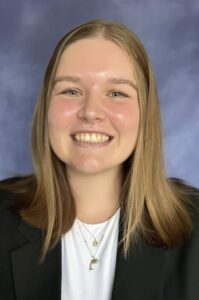Celebrating Our Recent PILS Summer Fellows—New Perspectives Gained
In this continuing series, with contributions by Marquette law students who were Public Interest Law Society summer fellows during 2024 (earlier entries being here, here, and here), we see some of the diverse ways Marquette law students are engaging with public interest legal work and how it shapes their futures as attorneys. Today, Sydney Gang reflects on her summer internship with Legal Action of Wisconsin’s Eviction Defense Project, where she noticed the relationship between empathetically engaging with clients and determining potential defenses to eviction.
 By Sydney Gang, 2L
By Sydney Gang, 2L
“Perspective can change everything” is what I always tell my friends. I believe there are endless perspectives that can change the way we view things. Sometimes when we think we have seen something from all angles, a new one appears and can completely change our opinion or viewpoint. The PILS Summer Fellowship gave me an entirely different perspective of the Milwaukee community, which I have never seen before and which I will carry into my legal career.
Before my internship, the thought of being evicted never even crossed my mind.
In my Wisconsin hometown community, evictions were unheard of—at least by me. My parents worked incredibly hard to give my brother and me everything, even though they came from poverty themselves. Since I have never experienced poverty and always had secure housing, I lacked the perspective of those who were facing an eviction or who are at risk of being evicted.
My PILS fellowship, working at Legal Action of Wisconsin, woke me up. On the first day of my summer internship in Legal Action’s housing unit, I was thrown into small claims court. If I had two words to describe small claims court, it would be organized chaos. Every bench was filled, lawyers dashed in and out of the courtroom to talk with clients, commissioners called names, and an overall gloomy mood sat in the room.
Among the organized chaos, though, was a courtroom full of stories—each one with a unique perspective. Eventually, when I was able to represent clients myself under the student practice rule, I would listen to their stories to better leverage their position in court. Although I had never been in their shoes, they explained what it was like to live in fear of losing their home and possessions. Many cried, got angry, or were quiet. Even if I was incapable of truly understanding their position, listening to them helped me appreciate at least to some degree what they were going through.
After hearing their story and collecting the facts of their cases, their stories made issue-spotting much easier than when I struggled in school with it. I was able to come up with possible defenses and give them a list of options that I could present to opposing counsel. When I would offer the clients different possibilities, their entire demeanor would change. Suddenly their eviction became much more manageable to overcome. The relief on their faces was truly rewarding. Even in cases involving a simple seal, clients sometimes broke down and cried, thanking me because they could finally find safe, secure, and affordable housing without an eviction on their record.
Volunteering had always been a back burner thought because I didn’t feel myself relating to the clients and was too focused on my own problems in life. I saw volunteering as more of a chore than having a greater purpose. However, after taking cases from start to finish (eviction cases don’t take long), where you see the impact on someone’s life, it was apparent how meaningful volunteering can be, how great the need is, and how few pro bono resources exist. Suddenly, making it to dinner on time was on the back burner.
You’re never done pursuing other perspectives, is what I will keep telling my friends. When you think you’ve seen it all, you haven’t. Although you will never truly be in the shoes of someone else, you can try your best. By showing empathy and understanding to others, you not only make them feel heard, but you also can leverage their position better in a legal setting and achieve client goals more effectively. The PILS Fellowship experience with Legal Action of Wisconsin was an invaluable experience that I will carry with me into my legal career and beyond when I need to see things from a new perspective.

 By Alana Borman, 2L
By Alana Borman, 2L By Mia Stevenson, 2L
By Mia Stevenson, 2L